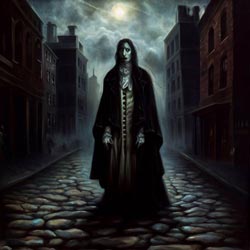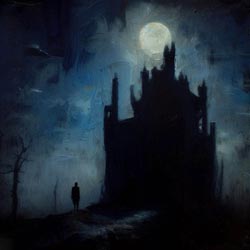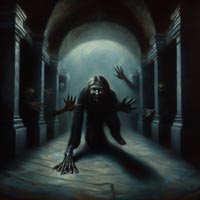 A literary chronicle of a macabre universe – such is the encompassing quality of Howard P. Lovecraft's "The Horror at Red Hook", a narrative adorned with his quintessential style, his dreadful setting and a complicated plot, submerged in the esoteric and uncanny, enshrouded in a sinister New York neighborhood. With its cobweb of sinister themes and labyrinthine narrative structure, it is an amalgamation of chilling prose and horror-fuelled imagination that conspires to lure readers into its eerie embrace (Borges, 1985).
A literary chronicle of a macabre universe – such is the encompassing quality of Howard P. Lovecraft's "The Horror at Red Hook", a narrative adorned with his quintessential style, his dreadful setting and a complicated plot, submerged in the esoteric and uncanny, enshrouded in a sinister New York neighborhood. With its cobweb of sinister themes and labyrinthine narrative structure, it is an amalgamation of chilling prose and horror-fuelled imagination that conspires to lure readers into its eerie embrace (Borges, 1985).
 Amid the annals of Howard Phillips Lovecraft's literary repertoire, "He" persists as a parable laden with his signature brand of disquieting dread, set amidst the cobwebbed and shadow-veiled labyrinth of old New York (Joshi, 2001). This tale, wrapped in the trappings of Gothic dread and cosmic horror, unveils a narrative where the delineations of time blur, and a sinister figure - the titular 'He' - holds dominion over temporal boundaries. Yet it's a narrative more rooted in human anxiety and fear, rather than extraterrestrial terror.
Amid the annals of Howard Phillips Lovecraft's literary repertoire, "He" persists as a parable laden with his signature brand of disquieting dread, set amidst the cobwebbed and shadow-veiled labyrinth of old New York (Joshi, 2001). This tale, wrapped in the trappings of Gothic dread and cosmic horror, unveils a narrative where the delineations of time blur, and a sinister figure - the titular 'He' - holds dominion over temporal boundaries. Yet it's a narrative more rooted in human anxiety and fear, rather than extraterrestrial terror.
 In the dismal realms of Lovecraftian literature, where stygian shadows pulse with an omnipresent malevolence and ancient horrors lurk beneath an illusory veneer of normality, there are narratives that transcend the ordinary - such is "The Moon-bog." This curious tale is an echo of dread, woven into the cryptic fabric of Lovecraft’s body of work, bringing forth the unsettling harmonics of a death-knell (Joshi, 2001). The weight of its horrific melody is unshakable, leaving the mind embroiled in a miasma of otherworldly despair.
In the dismal realms of Lovecraftian literature, where stygian shadows pulse with an omnipresent malevolence and ancient horrors lurk beneath an illusory veneer of normality, there are narratives that transcend the ordinary - such is "The Moon-bog." This curious tale is an echo of dread, woven into the cryptic fabric of Lovecraft’s body of work, bringing forth the unsettling harmonics of a death-knell (Joshi, 2001). The weight of its horrific melody is unshakable, leaving the mind embroiled in a miasma of otherworldly despair.
 To delve into the narrative crypt that houses "The Outsider," penned by the scribe of cosmic horror, Howard Phillips Lovecraft, is to journey through a necropolis of strangeness, an existential exploration that grips the reader in a chilling grasp of macabre uncertainty (Borges, 1971). The tale of the nameless protagonist, confined within an ancient castle, his life devoid of human contact, his existence predicated on darkness and desolation, becomes an echo of mankind's solitary passage through the shadowy corridors of life.
To delve into the narrative crypt that houses "The Outsider," penned by the scribe of cosmic horror, Howard Phillips Lovecraft, is to journey through a necropolis of strangeness, an existential exploration that grips the reader in a chilling grasp of macabre uncertainty (Borges, 1971). The tale of the nameless protagonist, confined within an ancient castle, his life devoid of human contact, his existence predicated on darkness and desolation, becomes an echo of mankind's solitary passage through the shadowy corridors of life.
 In the unspeakable annals of Howard Phillips Lovecraft's oeuvre, "In the Vault" stands as an irrefutable testament to his uncanny ability to weave narratives of brooding horror and quiet desperation. This grim tale, set in the depths of a forbidding burial vault, has a chilling intimacy unlike some of his other, more cosmically-inclined works. In this shadowed domain, where life and death commingle with a dreadful intimacy, Lovecraft crafts an experience of bone-chilling terror and a profound exploration of the human psyche in the face of death.
In the unspeakable annals of Howard Phillips Lovecraft's oeuvre, "In the Vault" stands as an irrefutable testament to his uncanny ability to weave narratives of brooding horror and quiet desperation. This grim tale, set in the depths of a forbidding burial vault, has a chilling intimacy unlike some of his other, more cosmically-inclined works. In this shadowed domain, where life and death commingle with a dreadful intimacy, Lovecraft crafts an experience of bone-chilling terror and a profound exploration of the human psyche in the face of death.
 An insidious shroud of dread seems to pervade each meticulously crafted sentence of Howard Phillips Lovecraft's chilling opus, "The Temple." This tale, undeniably an unforgettable contribution to the body of Lovecraftian literature, is a testament to his unparalleled ability to weave the grotesque and the sublime, the haunting and the obscure, into a narrative that leaves the reader profoundly unsettled.
An insidious shroud of dread seems to pervade each meticulously crafted sentence of Howard Phillips Lovecraft's chilling opus, "The Temple." This tale, undeniably an unforgettable contribution to the body of Lovecraftian literature, is a testament to his unparalleled ability to weave the grotesque and the sublime, the haunting and the obscure, into a narrative that leaves the reader profoundly unsettled.
 Plunging into the fathomless abyss that is "The Unnamable", the narrative resounds with echoes of Lovecraft's enduring cosmic horror. It is a fleeting but potent visitation to a realm where the intangible and the inconceivable loom, paradoxically manifest yet eluding capture within the brittle nets of human comprehension. With pen dipped in dread, Lovecraft excels in constructing an ethereal unease, imbuing every page with disquieting images that reach out from the void to grasp the reader's sanity.
Plunging into the fathomless abyss that is "The Unnamable", the narrative resounds with echoes of Lovecraft's enduring cosmic horror. It is a fleeting but potent visitation to a realm where the intangible and the inconceivable loom, paradoxically manifest yet eluding capture within the brittle nets of human comprehension. With pen dipped in dread, Lovecraft excels in constructing an ethereal unease, imbuing every page with disquieting images that reach out from the void to grasp the reader's sanity.
 Delving once more into the harrowing abyss of the human psyche and the cosmically uncanny, H.P. Lovecraft presents us with "The Festival", a tale imbued with his characteristically morbid and arcane aesthetics. Lovecraft entices readers into the gloomy, fog-shrouded realm of Kingsport, a locale that shall reverberate hauntingly in the canon of his work.
Delving once more into the harrowing abyss of the human psyche and the cosmically uncanny, H.P. Lovecraft presents us with "The Festival", a tale imbued with his characteristically morbid and arcane aesthetics. Lovecraft entices readers into the gloomy, fog-shrouded realm of Kingsport, a locale that shall reverberate hauntingly in the canon of his work.
- Lovecraft - Deaf, Dumb, and Blind, A Review
- Lovecraft - The Loved Dead, A Review
- Lovecraft - Under the Pyramids, A Review
- Cosmicism and Neocosmicism
- Lovecraft (Eddy) - The Ghost-Eater, A Review
- Lovecraft - The Rats in the Walls, A Review
- Lovecraft - Ashes, A Review
- Lovecraft - The Hound, A Review
- Lovecraft - Horror at Martin's Beach, A Review
- Lovecraft - What the Moon Brings, A Review






